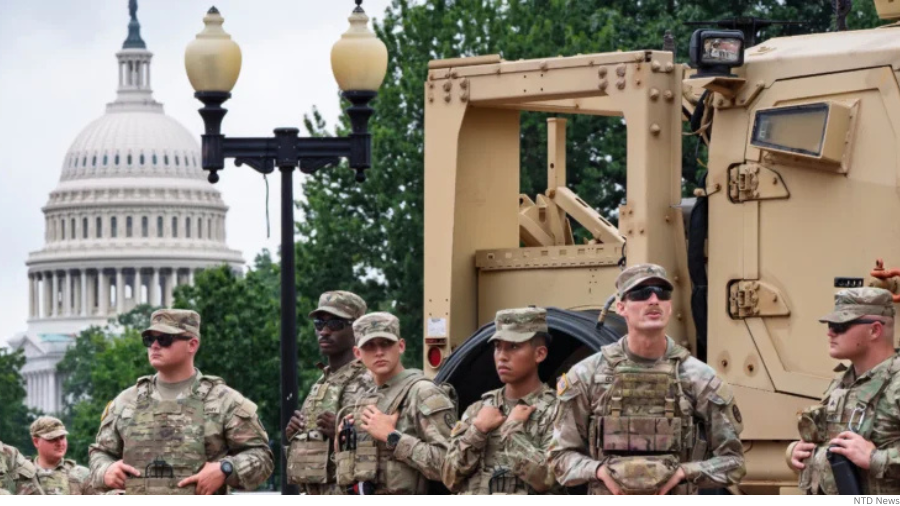A federal judge in Washington, D.C., on October 24 heard arguments in a legal challenge to President Donald Trump’s deployment of National Guard troops to the nation’s capital, as the federal courts begin evaluating the legality of the administration’s recent domestic military actions.
The deployment, ordered by Trump, involves the temporary stationing of National Guard personnel in the District of Columbia. The administration has argued that the troops are necessary to address what the president described as “rampant crime and violence” in Washington, as well as to assist in immigration enforcement and maintain public order.
During the hearing, attorneys representing the plaintiffs contended that Trump’s orders overstepped constitutional limits on the use of federal military forces for domestic purposes, citing concerns about potential violations of civil liberties and separation-of-powers principles. The plaintiffs argue that the deployment constitutes an inappropriate militarization of the city and could be used for political purposes beyond public safety.
“The deployment of troops on U.S. soil for domestic law enforcement is strictly circumscribed,” said one attorney for the plaintiffs. “The president cannot bypass Congress or state authorities to station military forces in a manner that threatens civil liberties.”
Legal and political context
The legal challenge is one of several emerging cases surrounding Trump’s approach to domestic security and immigration enforcement. Critics have long warned that using military personnel to enforce law on U.S. streets raises concerns under the Posse Comitatus Act, which generally prohibits federal troops from participating in civilian law enforcement without explicit authorization.
Supporters of Trump’s order argue that National Guard troops, when activated under federal authority but stationed in the District of Columbia, operate under separate rules that allow them to support law enforcement and assist with public safety functions. They emphasize that the deployment is temporary and is primarily intended to bolster security during heightened periods of concern in the capital.
In parallel, a West Virginia state court is considering a separate challenge to that state’s deployment of its National Guard personnel to Washington, D.C. The hearing in Charleston, West Virginia, was adjourned to next month to allow the judge to review additional evidence regarding the legality and authority under state law for sending troops out of the state for federal purposes.
The plaintiffs in the West Virginia case argue that the deployment could exceed the scope of the governor’s authority under state law and improperly expose state forces to political objectives beyond their constitutional mandate. The adjournment provides both sides additional time to present testimony and documentation supporting their positions.
Trump administration’s position
The Trump administration maintains that the deployment of National Guard troops to the nation’s capital is fully lawful and necessary. White House officials have stressed that the troops are not intended for routine policing, but rather to provide logistical support, intelligence assistance, and security reinforcement to local law enforcement agencies.
At a press briefing on October 22, the president’s spokesperson noted, “The National Guard is here to protect both the people of Washington and federal property, ensuring the capital remains safe and orderly. These actions are fully within the authority granted to the president and the governors who contribute forces.”
The administration also cited a spike in certain types of crime and ongoing threats to public safety as justification for the measures. Trump has repeatedly framed the deployment as essential to safeguarding both citizens and federal institutions, particularly in the context of increased immigration enforcement activities in the District.
Expert analysis
Legal scholars note that the case raises significant questions about the limits of executive power, particularly when military forces are used domestically. While the president has authority to mobilize the National Guard under federal statutes, courts historically have been cautious in permitting military involvement in civilian matters, emphasizing civil liberties, proportionality, and oversight.
“Courts tend to scrutinize these kinds of deployments carefully because they touch on core constitutional protections,” said Dr. Lisa Hammond, a constitutional law expert at Georgetown University. “The key question is whether the president has exceeded the statutory and constitutional boundaries that govern domestic military operations.”
Some observers also see political implications in the case, noting that it arrives amid heightened national debate over public safety, immigration enforcement, and the appropriate use of federal forces in U.S. cities.
Potential outcomes
The federal court has not yet issued a ruling, and it remains unclear how long the litigation will take. Legal experts suggest that if the court finds the deployment exceeds presidential authority, it could set a precedent limiting the use of federal military forces for domestic law enforcement, potentially affecting future administrations.
Meanwhile, the West Virginia case may clarify state-level authority regarding the deployment of National Guard troops outside state borders, an issue that could have implications for multi-state coordination and federal requests for assistance.
Both cases underscore the delicate balance between ensuring public safety and preserving constitutional safeguards in the use of military personnel on U.S. soil.
Broader implications
Observers note that the outcome could influence national policy on security and the role of the military in domestic matters. If courts rule against the administration, it may constrain presidential discretion and require additional legislative or judicial oversight before future deployments. Conversely, a ruling in favor of the administration could expand executive authority and encourage broader use of military forces in urban centers during times of perceived crises.
For now, both federal and state courts are poised to continue examining the legal boundaries of troop deployments in the nation’s capital, with decisions likely to reverberate through U.S. domestic and constitutional law for years to come.
%20(4).png)








